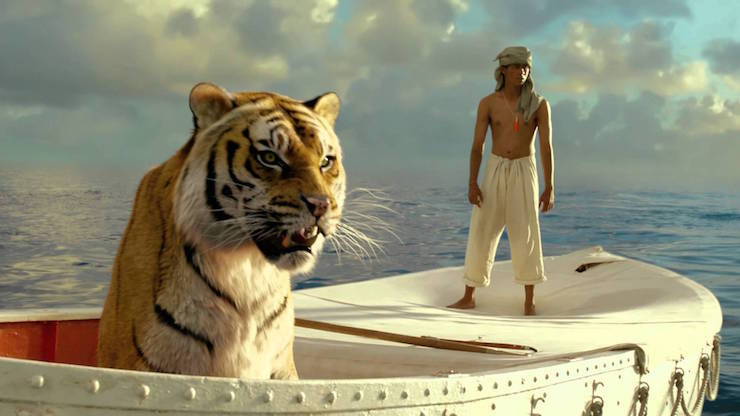It was important to me to write the survival skills described in my debut novel, The Last One, as accurately as possible. My main character isn’t an expert, and I needed to know what mistakes she could make. There are also characters who are experts, and I wanted to be able to write them convincingly as well. That’s why I undertook weeks of hands-on wilderness survival training while writing the book—so I could get it right. Or, at the very least, so I wouldn’t get it horribly, horribly wrong. While taking a handful of survival classes doesn’t make me an expert, I do know enough now to appreciate when a novel gets an important aspect of survival right.
Here are five novels that do:
The Martian by Andy Weir
 When Watney comes to with a piece of an antenna sticking through him, he doesn’t hesitate—he acts. In what most of us would surely consider a hopeless situation, he relies on his training and saves himself from the most immediate threat to his life. That split-second decision—I’m not going to die here—is key to surviving many emergency situations. Moving forward, Watney’s resourcefulness and sense of humor are his main survival tools, not to mention his crazy depths of scientific knowledge. The Martian underscores the importance of ingenuity: When you’re in a true survival situation, you do whatever you need to do to survive, no matter how absurd. Even if that means growing potatoes in your own excrement.
When Watney comes to with a piece of an antenna sticking through him, he doesn’t hesitate—he acts. In what most of us would surely consider a hopeless situation, he relies on his training and saves himself from the most immediate threat to his life. That split-second decision—I’m not going to die here—is key to surviving many emergency situations. Moving forward, Watney’s resourcefulness and sense of humor are his main survival tools, not to mention his crazy depths of scientific knowledge. The Martian underscores the importance of ingenuity: When you’re in a true survival situation, you do whatever you need to do to survive, no matter how absurd. Even if that means growing potatoes in your own excrement.
The Wolf Road by Beth Lewis
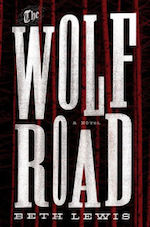 Elka, the young narrator of this novel, is a master of reading her environment. Though she’s often forced to throw caution to the wind, she at least knows she should be cautious. Elka respects nature and its power. Too often, in our world, when people get in trouble in the wilderness it’s because they overestimate their own abilities while underestimating nature. Not Elka. She’s also got some killer wilderness survival skills. Need help setting a snare or skinning a squirrel? Ask Elka.
Elka, the young narrator of this novel, is a master of reading her environment. Though she’s often forced to throw caution to the wind, she at least knows she should be cautious. Elka respects nature and its power. Too often, in our world, when people get in trouble in the wilderness it’s because they overestimate their own abilities while underestimating nature. Not Elka. She’s also got some killer wilderness survival skills. Need help setting a snare or skinning a squirrel? Ask Elka.
Breaking Wild by Diane Les Becquets
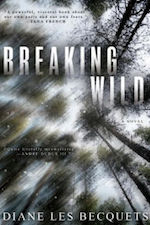 A hunter goes missing in the woods. A ranger sets out to find her. Reading this novel, I had an inner monologue going that was essentially, “Yes… yes… wow, really? Yes!” The realities of emergency wilderness situations are bluntly portrayed—how quickly a situation can go south when poor decision-making is involved—and the portrayal of search and rescue procedure is fascinating. I don’t have experience in search and rescue, but I believe the author, and for days after finishing this novel I bit back an urge to join local search and rescue outfits just to learn more.
A hunter goes missing in the woods. A ranger sets out to find her. Reading this novel, I had an inner monologue going that was essentially, “Yes… yes… wow, really? Yes!” The realities of emergency wilderness situations are bluntly portrayed—how quickly a situation can go south when poor decision-making is involved—and the portrayal of search and rescue procedure is fascinating. I don’t have experience in search and rescue, but I believe the author, and for days after finishing this novel I bit back an urge to join local search and rescue outfits just to learn more.
The Red Rising Trilogy by Pierce Brown
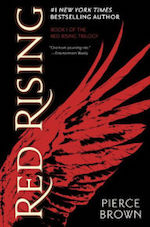 Brown is a master of taking the sci-fi trope of “We’re the good guys overthrowing tyrants; we’ll suffer some sad losses along the way, but it’ll all be worth it—yay!” and grounding it in harsh reality. This trilogy is a breakneck read, yet also at times heartbreaking. It acknowledges the truth that when things get really rough, survival is isn’t pretty, or fun—it’s ugly—and if you’re in the wrong place at the wrong time, you might not even have time to make that split-second “I’m not going to die” decision. There can be a certain amount of randomness to survival; often not everyone will make it, no matter how well prepared they are.
Brown is a master of taking the sci-fi trope of “We’re the good guys overthrowing tyrants; we’ll suffer some sad losses along the way, but it’ll all be worth it—yay!” and grounding it in harsh reality. This trilogy is a breakneck read, yet also at times heartbreaking. It acknowledges the truth that when things get really rough, survival is isn’t pretty, or fun—it’s ugly—and if you’re in the wrong place at the wrong time, you might not even have time to make that split-second “I’m not going to die” decision. There can be a certain amount of randomness to survival; often not everyone will make it, no matter how well prepared they are.
Life of Pi by Yann Martel
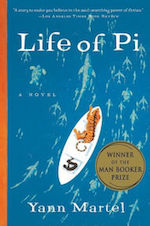 Stranded on the ocean, Pi Patel employs some impressive survival skills. But that’s not why I chose this book. I chose this book because sometimes a situation is so terrible you need to tell yourself a story in order to get through it. That can mean staring down an impossible-seeming situation and telling yourself “I can do this,” or it can occur after the fact: “I had no choice.” Human beings are storytellers, and those stories aren’t confined to books and movies. Every memory is a story, every anecdote about our day is a story. And sometimes what you’ve experienced is so awful, so hard, you need a way to digest it and make sense of it. This novel, to me, underscores how important storytelling can be to survival.
Stranded on the ocean, Pi Patel employs some impressive survival skills. But that’s not why I chose this book. I chose this book because sometimes a situation is so terrible you need to tell yourself a story in order to get through it. That can mean staring down an impossible-seeming situation and telling yourself “I can do this,” or it can occur after the fact: “I had no choice.” Human beings are storytellers, and those stories aren’t confined to books and movies. Every memory is a story, every anecdote about our day is a story. And sometimes what you’ve experienced is so awful, so hard, you need a way to digest it and make sense of it. This novel, to me, underscores how important storytelling can be to survival.
Top image: Life of Pi (2012)
 Alexandra Oliva was born and raised in upstate New York. She has a BA in history from Yale University and an MFA in creative writing from The New School. She lives in the Pacific Northwest with her husband. The Last One is her first novel.
Alexandra Oliva was born and raised in upstate New York. She has a BA in history from Yale University and an MFA in creative writing from The New School. She lives in the Pacific Northwest with her husband. The Last One is her first novel.










